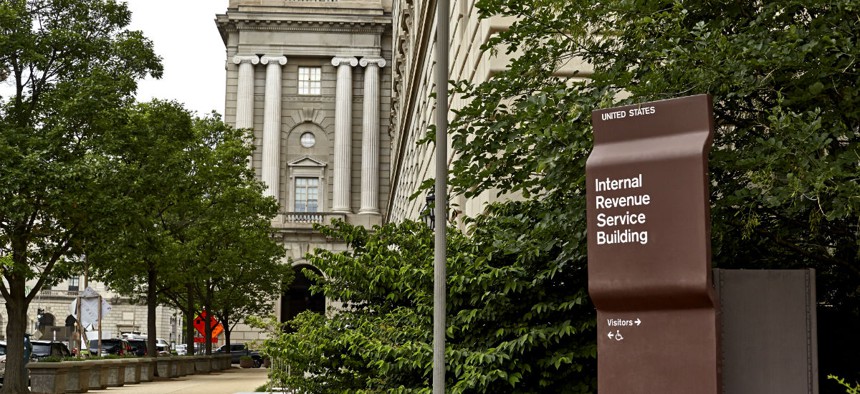
IRS headquarters in Washington. Pamela Au/Shutterstock.com
IRS’s Controversial Review of Nonprofits Was Broader Than Reported, IG Says
Scrutiny of tea party groups that angered Republicans extended to progressive groups too.
Offering new information on an old controversy, a watchdog on Thursday painted an altered image of the Internal Revenue Service’s much-disputed past scrutiny of nonprofits seeking tax-exempt status.
The Treasury Inspector General for Tax Administration—whose 2013 report on nonprofits triggered a major political battle in Congress over alleged political bias—released an updated report that reaches further into the past and evaluates more of the criteria used by IRS screeners in determining whether applicants were truly “social welfare” groups or fronts for political interests.
The response among lawmakers to the new information broke down on party lines.
Past reports found that about one-third of 298 applications flagged for extra screening by the team of specialists included key words such as Tea Party, Patriots, or other right-leaning phrases in their names, while the remainder did not.
The remainder, as Democrats have long argued, included progressive or liberal groups, such as the now-disbanded Association of Community Organizations for Reform Now (ACORN), using key words that suggest environmental or marijuana advocacy, or anti-Wall Street orientations.
The new TIGTA appears to confirm that view.
Applicants across the political spectrum were subjected to lengthy delays and requests for additional paperwork while IRS officials struggled to define a consistent policy that would justify denying tax-exempt status to groups that are too political. The new TIGTA report, based on a new review of training materials and bipartisan congressional input, focuses on 17 criteria long used by screeners at the IRS Exempt Organizations division. It examines the handling of specific groups, finding, for example, that examination for some politically sensitive groups took nearly five times longer.
The auditors wrote, “Based on our analysis of training materials and available documentation as well as interviews with employees, we identified four versions of the Progressive criterion used from October 2005 through April 2013. Specifically, the available evidence indicates that the IRS thought a new political party was being formed and wanted to process the cases consistently. It was concerned that the organizations were applying for I.R.C. § 501(c)(3) status and were engaging in partisan political activity, which is inconsistent with tax-exempt law.”
Because the IRS since the controversy has revamped its procedures for reviewing nonprofit applications, auditors did not make new recommendations. But the watchdog had disagreed with some of the IRS managers’ reactions to past recommendations, and proposed improvements in consistency and documentation as to why some applicants generated suspicion.
“The response [from IRS managers] states that our report views approvals as evidence that the Exempt Organizations function should not have looked closely at those applications,” TIGTA previously wrote. “We disagree with this statement. Our objection was to the criteria used to identify these applications for review. We believe all applications should be reviewed prior to approval to determine whether tax-exempt status should be granted.”
The IRS officials previously argued that some organizations “may not understand what constitutes political campaign intervention or may provide vague descriptions of certain activities that the EO function knows from past experience potentially involve political campaign intervention.”
Rep. Elijah Cummings, D-Md., the ranking member of the House Oversight and Government Reform Committee who long battled the Republicans over the interpretation of the IRS’s conduct in the affair, issued a review of past rebuttals, saying, “Republicans claimed from the beginning that the Obama White House directed the IRS to target conservative groups for political reasons, but there was never any evidence to support their claims. After Republicans spent years investigating this issue and squandering millions of taxpayer dollars, today’s report confirms what we knew years ago—that progressive groups were also selected for heightened scrutiny and that the tax-exempt status of some progressive groups was severely delayed as a result.”
Former committee chair Rep. Darrell Issa, R-Calif., told Government Executive, “The committee reviewed millions of pages of documents from the IRS during the my chairmanship and we looked at the scrutiny that progressive groups got compared to the treatment of conservatives in a 140-page report that we released in April of 2014. What we found remains true today – conservative groups were subjected to heightened scrutiny that resulted in delays and mistreatment that deprived these groups of their constitutional rights. An honest look at the evidence clearly demonstrates that conservative groups were separated, scrutinized and mistreated far more often than their progressive counterparts.”
John McGlothlin, counsel of the Cause of Action Institute, one of several conservative groups that attacked the IRS for alleged political targeting, said, “This report confirms just how long the IRS has mistreated groups of citizens trying to exercise their legal rights. Unfortunately, the report ignores a cause of this mistreatment which remains unaddressed: an IRS policy that lets the agency delay applications because of media or congressional attention, not because of any flaws in the application itself. Until this rule is changed, the IRS is liable to keep making the same mistakes it has for over a decade.”







